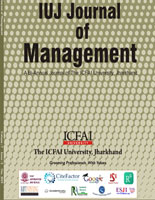(Sarosh Kothandath)
Keywords : Project Success, Success criteria, Perceived difficulty level, Polychoric correlation, Bayesian analysis, ordinal factor analysis
EOI : eoi.citefactor.org/10.11224/IUJ.08.01.01



 The IUJ Journal of Management (IUJ-JOM) is the flagship journal of ICFAI University Jharkhand, Ranchi.
The aim of the journal is to provide insight into the business and management research. It also creates
a platform for the researchers, academicians, professors , practicing management professionals and proponents
in disseminating original,
The IUJ Journal of Management (IUJ-JOM) is the flagship journal of ICFAI University Jharkhand, Ranchi.
The aim of the journal is to provide insight into the business and management research. It also creates
a platform for the researchers, academicians, professors , practicing management professionals and proponents
in disseminating original,
theoretical and applied research in the field of management and allied disciplines. The Journal is a Bi-Annual, . . . . .Read more.
 Research on project success and stakeholder management suggests that success perceptions for projects among stakeholders show major relative variations; these variations can largely be attributed to the criteria each stakeholder considers in evaluating the project. Stakeholders consider different success criteria in their evaluation based on their interest/involvement in the particular project, their understanding of the project and outcomes among others.
. . . . . . .
Read more.
Research on project success and stakeholder management suggests that success perceptions for projects among stakeholders show major relative variations; these variations can largely be attributed to the criteria each stakeholder considers in evaluating the project. Stakeholders consider different success criteria in their evaluation based on their interest/involvement in the particular project, their understanding of the project and outcomes among others.
. . . . . . .
Read more.
 Displacement is inherent in the policy of development which is guided by neoliberal economic reforms under globalization. It is basically accumulation by dispossession and forceful expulsion of rural people from their land. The commodification of land is fuelling the land acquisition and forceful expulsion from land favour a minority group while millions of people pay the price without reaping any benefits. Along with land grabbing, resettlement and rehabilitation policies are integrally related. . . . . . . .
Read more.
Displacement is inherent in the policy of development which is guided by neoliberal economic reforms under globalization. It is basically accumulation by dispossession and forceful expulsion of rural people from their land. The commodification of land is fuelling the land acquisition and forceful expulsion from land favour a minority group while millions of people pay the price without reaping any benefits. Along with land grabbing, resettlement and rehabilitation policies are integrally related. . . . . . . .
Read more.
 TDoes occupational stress affect job performance and job satisfaction? To find out the answer to this research question, this research work has carried out. To do this research study 200 women employees of co-operative society’s (Banks) were selected through simple sampling method. The well structured questionnaire was utilized to collect the data from the respondents and Articles, Journals, websites etc were used as a secondary source of data. . . .
Read more.
TDoes occupational stress affect job performance and job satisfaction? To find out the answer to this research question, this research work has carried out. To do this research study 200 women employees of co-operative society’s (Banks) were selected through simple sampling method. The well structured questionnaire was utilized to collect the data from the respondents and Articles, Journals, websites etc were used as a secondary source of data. . . .
Read more.
Subscribe now to get notified about IU Jharkhand journal updates!
(Sarosh Kothandath)
Keywords : Project Success, Success criteria, Perceived difficulty level, Polychoric correlation, Bayesian analysis, ordinal factor analysis
EOI : eoi.citefactor.org/10.11224/IUJ.08.01.01
(Chandra Kanta Saha )
Keywords : Development, displacement, land acquisition, sustainable development policies, Resettlement and rehabilitation, vulnerable, compensation
EOI : eoi.citefactor.org/10.11224/IUJ.08.01.02
( "Dr. Prakash b. Kundaragi; Dr. Sachin k. Parappagoudar" )
Keywords : Occupational stress, Job performance, Job satisfaction, Co-operative societies
EOI : eoi.citefactor.org/10.11224/IUJ.08.01.03
( "Dr. Prasanjit Dasgupta; Dr. D.M.Pestonjee" )
Keywords : Emotional Exhaustion; Nurse; Nursing Role Stress; Perceived Organizational Support; Power Distance Environment
EOI : eoi.citefactor.org/10.11224/IUJ.08.01.04
( Dr. Gopaldas Pawan Kumar )
Keywords : Teacher traits, Teacher responsibilities, Student expectations, Academics
EOI : eoi.citefactor.org/10.11224/IUJ.08.01.05
( Friday Ogbu Edeh )
Keywords : Transactional Leadership, Workers Emotional Labour, Deep Acting, Surface Acting, Contingent Rewards, Active Management by Exception
EOI : eoi.citefactor.org/10.11224/IUJ.08.01.06
( "Ghanshyam Dos; Dr. Ramesh Kumar Chaturvedi" )
Keywords : Consumer behavior, Patanjali Ayurveda limited, Consumer buying behavior, Innovativeness, Extensive Distribution and Consumer Focus Strategy.
EOI : eoi.citefactor.org/10.11224/IUJ.08.01.07
( "Colonel (Dr) J. Satpathy; Prof (Dr) Saylee Gankar; Prof (Dr) Jagannath Patnaik" )
Keywords : Neuropsychoeconomics, Psychoeconomics, behaviours
EOI : eoi.citefactor.org/10.11224/IUJ.08.01.08
( Brig JS Rajpurohit )
Keywords : Terrorism, Jammu and Kashmir, Covid-19 pandemic, Pakistan, India.
EOI : eoi.citefactor.org/10.11224/IUJ.08.01.09
( "Mr. Santa Prasad Roy; Dr. Dilip Kumar" )
Keywords : Gender, Disparities, Girls, School, Education, Community Participation.
EOI : eoi.citefactor.org/10.11224/IUJ.08.01.10
( Shruti Singh )
Keywords : Retail Image, Customer Perception, advertisers, messages, measurement.
EOI : Employee Engagement, Gamification, Human Resources, Employee Behaviour
( "Sujoy Kumar Dhar" )
Keywords : Corona virus disease-2019, Diagnosis, Treatment and Precaution
EOI : Governance, Non-performing asset, Board, Capital adequacy,Net profit
( "Swati Shrivastava" )
Keywords : Mergers and Acquisitions (M&A); Conceptual Model; Economic Turf, Strategic Assets and Cultural Environment
EOI : eoi.citefactor.org/10.11224/IUJ.08.01.13
( Maneka Perikkathara )
Keywords : Not Applicable
EOI : eoi.citefactor.org/10.11224/IUJ.08.01.14
( "Innocent Soren; Dr. Satyendra kishore" )
Keywords : SHG, IGA, SHPI, Low-level equilibrium trap, Development actors.
EOI : eoi.citefactor.org/10.11224/IUJ.08.01.15
